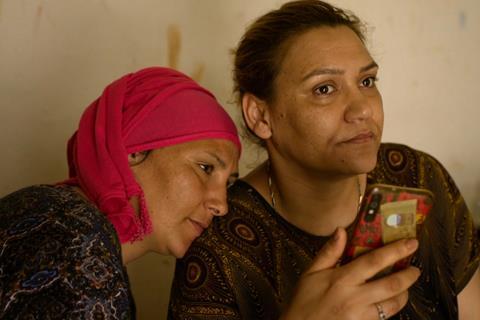A trio of female wedding singers find freedom in their art in this involving Tunisian documentary

Dir/scr: Sonia Ben Slama. Lebanon, Tunisia, France, Qatar. 2023. 82mins
The bittersweet emotions of someone else’s wedding are repeatedly amplified in the second feature-length documentary from Tunisian-French filmmaker Sonia Ben Slama (Maktoub), which offers an intimate portrait of a mother and two daughters who work as Tunisian wedding musicians. Professional lives stand in sharp contrast to personal dilemmas in a film that illustrates a society firmly in the grip of traditional social values. This involving human tale should find a fulsome festival future following its world premiere at Visions Du Reel in April and a showcase in the Cannes ACID sidebar.
A modest, unassuming film with a sharp human focus
Fatma and her daughters Najeh and Waffeh, are ‘machtat’ – wedding musicians – in the small Tunisian city of Mahdia. We witness them perform at a number of ceremonies threaded throughout the film. They fuss over the beautiful china-doll-like brides, in all their finery. They calm their nerves, push a stray hair back into place, adjust a spectacular dress and announce the money gifts offered by family and friends. They are determined to make the day special. The women celebrate the nuptials in song, the playing of traditional instruments and enthusiastic ululations. Ben Slama captures the pride in their service. There is a sense of liberation in the ease of their movements and the energy of their commitment.
The contrast comes in their private lives. A weary Fatma has spent four decades in the profession yet remains a gap-toothed ray of sunshine and understanding. Najeh has been long divorced and now lives with her mother, her brothers and her two teenage sons. She has not given up hope of finding a new husband. Waffeh is married to an abusive man who leaves her in fear for her life; ending the marriage seems to be beyond her as she contemplates the consequences for her children. The only true freedom these women have comes during their wedding performances in the summer months.
Content to observe the everyday realities of these lives, Ben Slama has clearly developed a sympathetic bond with the women and captures them at their most vulnerable. The camera is even present during a bitter family dispute over Waffeh’s plans for the future. The footage of days spent mostly indoors, cooking, cleaning and sharing a modest space, underlines their restricted lives; the use of close-ups and the claustrophobia of confined spaces helps build the sense of the woman as caged birds. The rare sight of Najeh outdoors at night on a city street feels fraught with danger. A wedding provides a safe space where the women can move, socialise and luxuriate in the shared emotions.
Ben Slama ensures that the men in their lives are heard but not seen. We never glimpse Waffeh’s husband and only hear the bark of his commands in their telephone conversations. We also never see Najeh’s potential new suitor, only hear his evasions and uncertainty. Men issue orders, treat the women with disdain and make unreasonable demands, and we are privy to the women’s reactions and frustrations. It all contributes to a wider picture of a society in which marriage offers the hope of financial security but rarely seems to have anything to do with love. The fact that Waffeh is contemplating a lucrative marriage between her 17 year-old daughter and a 41 year-old man becomes a flashpoint in the conflict with her sister.
Machtat is a modest, unassuming film with a sharp human focus. There are no happy endings or easy answers. Instead, we are allowed to share a sense of these women’s lives and then left to speculate about what might lie ahead for them – and future generations.
Production companies: Alter Ego Productions, Khamsin Films, Lyon Capitale TV
International sales: Alter Ego Productions info@alterego-production.com
Producers: Tania El Khoury, Cecile Lestrade, Elise Hug
Cinematography: Evgenia Alexandrova
Editing: Young-Sun N






![The Brightest SunScreen[Courtesy HKIFF]](https://d1nslcd7m2225b.cloudfront.net/Pictures/274x183/3/5/0/1448350_thebrightestsunscreencourtesyhkiff_312678.jpg)















![The Brightest SunScreen[Courtesy HKIFF]](https://d1nslcd7m2225b.cloudfront.net/Pictures/100x67/3/5/0/1448350_thebrightestsunscreencourtesyhkiff_312678.jpg)

